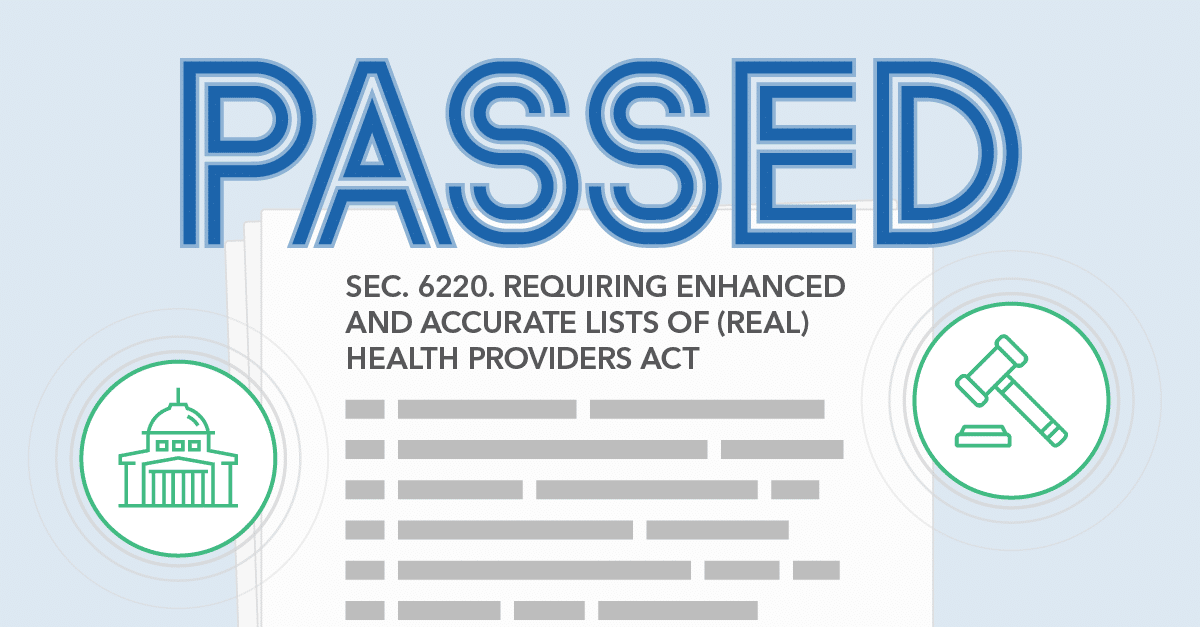Federal and state regulators, along with lawmakers, are actively amending network adequacy and provider directory accuracy requirements while intensifying oversight. These changes have far-reaching implications for medical and ancillary plans. Understanding the key developments and emerging trends is essential for stakeholders to ensure strategic alignment and maintain compliance.
Medicare Advantage
Medicare Advantage (MA) Organizations are required to verify provider information every 90 days to include specific data elements. Additionally, directories must be updated within 30 days of receiving new or corrected information.
💡 Read our blog to learn more about the Medicare Advantage Provider Directory requirements.
Initial applications and service area expansions must demonstrate network adequacy for the proposed provider networks. For those using Letters of Intent to contract during the application process, a Triennial Network Adequacy Review is mandated the first year the plan is operational.
Annual Behavioral Health Services Activity Verification: To reduce ghost networks in behavioral health services, MA organizations must annually verify that listed behavioral health providers—including Physician Assistants (PAs), Nurse Practitioners (NPs), and Clinical Nurse Specialists (CNSs)—have provided services to at least 20 patients in the past year.
💡 Read our blog on Behavioral Health Policies in Medicare Advantage to learn more about the requirements.
CMS Oversight: The Centers for Medicare & Medicaid Services (CMS) play a critical role in maintaining the integrity of provider directories through various compliance measures. CMS enforces ongoing adherence to standards via online directory reviews, ad-hoc audits, and other established monitoring activities. These measures are designed to guarantee that MA organizations meet their obligations and that beneficiaries receive proper guidance on available healthcare options.
What to Watch: Continuous advancements in compliance mechanisms and potential revisions to annual verification requirements.
Marketplace and Exchanges
Federally-facilitated Exchanges
New Network Adequacy Standards: Introduction of Geographic Distance Calculations as the new time and distance methodology, along with Alternative Time and Distance standards. Download our Marketplace Policy Brief to learn more.
Updated Provider Validations: Additional provider data validations have been added to the QHP Certification process. These include limiting providers to a maximum of 10 practice locations and 2 specialties.
State-based Exchange Alignment
State-based exchanges are now required to adopt similar network adequacy standards as those on the federal exchange, including time and distance, provider specialty lists, and network reviews. Additionally, documented outreach and attestation procedures are required to maintain provider data integrity.

Stay ahead with the latest QHP network adequacy requirements! Download our policy brief now to discover the key changes and updates that will shape the future of QHP certification. Don’t miss out on essential insights for your plans!
Download the Policy Brief
Medicaid
New Provider Data Accuracy Regulations
Effective July 1, 2025, new regulations introduced under the Consolidated Appropriations Act (CAA) and the Medicaid/CHIP Managed Care Access Final Rule will affect Medicaid and CHIP programs. Key updates include:
- Programs are required to implement provider outreach and verification processes to meet directory accuracy requirements.
- Applicability to Medicaid and CHIP Fee-for-Service (FFS) programs, Managed Care Organizations (MCOs), Prepaid Inpatient Health Plans (PIHPs), Prepaid Ambulatory Health Plans (PAHPs), and Primary Care Case Management (PCCM) entities.
While specific requirements may vary for the different Medicaid programs, several common themes emerge.
Verification of Specific Provider Directory Data Elements: This includes verifying provider contact information, specialty, cultural and linguistic capabilities, acceptance of new Medicaid patients, and network status.
Timely Updates to Searchable Electronic Provider Directories: A searchable, electronic provider directory must be updated no later than 30 calendar days after the plan entity receives updated provider information.
Quarterly and On-Demand Updates: Provider directories are to be updated at least quarterly or more frequently, as required by the state and/or Secretary of Health and Human Services.
Comprehensive Provider Outreach and Verification Processes: Plans are required to develop and deploy provider outreach and verification processes to adhere to the new standards.
What to Watch: Continued legislative changes to state-specific Medicaid network adequacy, provider data accuracy, and provider outreach frameworks.
No Surprises Act
Provider Directory Verification Requirements
The No Surprises Act continues to have significant implications, mandating health plans, providers, and healthcare facilities to maintain accurate provider directories and promptly notify participants about whether a particular provider is in-network. The rule requires verification processes to ensure listed providers are up-to-date, removing any unverifiable information.
Similar to Marketplaces and Medicaid, states continue to align regulations with the No Surprises Act provider directory requirements. While states may have specific requirements, here are the foundational requirements.
Provider Data Verification: Plans must implement a provider verification process. Any providers or facilities with unverifiable information must be removed from the provider directory. Plans are obligated to verify and update their provider directories at least every 90 days. Directories must be updated within two business days of receiving a provider update and respond to consumer inquiries within one business day.
💡 Explore our Provider Data Accuracy Resource Hub to find more news, videos, and best practices for complying with the No Surprises Act.
Tip: Gain a better understanding of what’s working well and what needs improvement in your current process by using our Provider Data Accuracy Assessment Toolkit.
Provider Directory Accuracy Policy Trends
As the healthcare industry continues to transform, regulators and policymakers are increasingly working to enhance the standards that govern it. This dynamic environment is driven by a strong commitment to improving consumer access, ensuring transparency, and refining the healthcare delivery experience. Among these developments, several trends in provider data accuracy are gaining prominence across various markets. Understanding these trends and their implications is crucial for healthcare professionals, insurers, and decision-makers.
1. Shorter Provider Verification Timelines
One of the most notable regulatory changes involves the shift from annual, semi-annual, or traditional quarterly provider verification cycles to a rolling 90-day or shorter provider outreach and verification schedule. This accelerated timeline requires health plans to modify their processes and systems to verify provider information more often, ensuring compliance and data accuracy. As a result, it is essential to implement efficient technologies and practices for ongoing data validation and provider engagement.
2. Greater Transparency in Provider Outreach and Responsiveness
Regulations are putting more emphasis on health plans demonstrating provider outreach efforts and tracking responsiveness. Metrics in this area include:
Provider Outreach Activities: Data demonstrating provider outreach efforts, including the frequency and methods of communication used to verify and update provider information.
Provider Responsiveness Metrics: Detailed reporting on how providers responded, including the method and timeframe of their responses.
💡 Did you know? Quest Enterprise Services® (QES®) Accuracy has introduced more metrics to help you track provider outreach and compliance! Discover how Days Nonresponsive and Last Attested Date can keep you on top of regulatory requirements. Read our blog for details!
3. Faster Provider Directory Updates
New mandates require quicker turnaround times for updating provider information and communicating network changes. For example, we continue to see 2-day turnaround timelines to update directory information on websites and 5-day turnaround timelines to inform patients about network changes. Health plans must be agile and responsive to promptly capture changes in provider status, network participation, or contact information in their directories.
4. Annual Accuracy Improvement Targets
States are increasingly adopting performance benchmarks to help health plans demonstrate improvements in data accuracy. For instance, a health plan may be required to show a 2% annual increase in data accuracy.
5. Claims Data Integration to Address Ghost Providers
Regulators are exploring adding claims data to existing provider directory accuracy requirements to help minimize ghost providers. This new requirement expands upon the existing provider directory accuracy regulations instead of replacing them.
Example: Medicare Advantage Behavioral Health Verification Requirements
State Examples: Illinois, Oklahoma, New Mexico, and Massachusetts.
Proposed Federal Legislation: The Requiring Enhanced & Accurate Lists of (REAL) Health Providers Act, targets ghost networks in Medicare Advantage Organizations.
Takeaways for Organizations
With regulatory oversight increasing, organizations face growing pressures to adapt to new requirements. Regular provider verification, greater data transparency, timely directory updates, and efforts to avoid ghost networks are essential for compliance and improved patient care. From improving data transparency to simplifying provider outreach & verification, Quest Enterprise Services® (QES®) Accuracy can help your team tackle these challenges head-on. Learn more about QES Accuracy today!
Elevate Your Provider Data Accuracy with QES Accuracy
Discover how Quest Enterprise Services® (QES®) Accuracy can make a difference. Our comprehensive solutions enhance your process, offer better data transparency, reduce ghost networks, and improve compliance. Empower your organization to excel in the evolving healthcare landscape. Learn more about Quest Enterprise Services® (QES®) Accuracy today!
Know Your Data, Grow Your Business
Get a complimentary strategy session with a Quest Analytics expert to learn how we can help you maintain network adequacy, improve data accuracy and achieve astonishing efficiencies.











